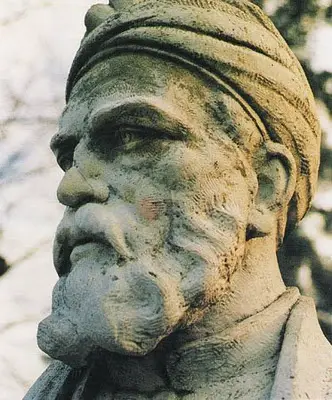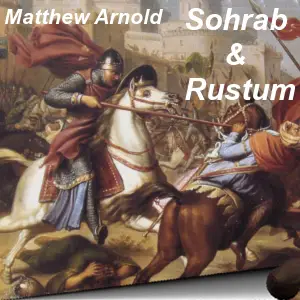The poem Sohrab and Rustum by Matthew Arnold is taken from Firdausi’s Persian epic. It recounts, in blank verse adorned by epic similes, the fatal outcome of Sohrab’s search for his father Rustum, the leader of the Persian forces.
The principal hero of the poem is the mighty Rustum, who, mounted on his famous horse Ruksh, performed prodigies of valor in defence of the Persian throne. Of all his adventures his encounter with Sohrab is the most dramatic.

One noon, while he was sleeping his horse, had disappeared. Looking for his horse he came to Semenjan. There the king of Semenjan had a fair daughter named Tahmineh, who had become enamoured of Rustum because of his mighty exploits. Fascinated by her beauty, Rustum married her.
For a time all went happily, then Rustum found it necessary to leave his bride, as he thought, for only a short time. At parting he gave her an onyx, which he wore on his arm, bidding her, if a daughter should be born to their union, to twine the gem in her hair under a fortunate star; but if a son, to bind it on his arm, and he would be insured a glorious career. To the lonely bride was born a marvellous son, whom, she named Sohrab. Fearing Rustum would send for the boy when he grew older, Tahmineh sent word to him that the child was a girl–“no son”.

In his youth, Sohrab insisted that his mother, who had concealed the fact, should inform him of the name of his father. Being told that it was the renowned Rustum, he exclaimed, “Since he is my father, I shall go to his aid; he shall become king of Persia and together we shall rule the world.”
Sohrab, with his army and that of Afrasiab, set out, intending to fight his way until Rustum should be sent against him when he would reveal himself to his father and form an alliance with him that would place the line of Seistan on the throne. On the way southward, Sohrab overthrew and captured the Persian champion, Hujir. Disappointed at his failure to find his father, Sohrab led his army in a fierce onslaught on the Persians, driving them in confusion before him.
King Kai Kaoos, in great terror, sent for Rustum to hurry to his aid. Rustum accompanied the Persian army, under the king Kai Kaoos, which at once set forth to encounter Sohrab.
They fought for three days. On the second day of the fight, Sohrab succeeded in felling Rustum to the earth. On the third day Rustum, by a supreme effort, seized Sohrab around the waist and hurled him to the ground. Then, fearing lest the youth prove too strong for him in the end, he drew his blade and plunged it into Sohrab’s bosom.
Sohrab forgave Rustum but warned him to beware the vengeance of his father, the mighty Rustum, who must soon learn that he had slain his son Sohrab. These words were as death to the aged hero, who fell senseless at the side of his wounded son. When he had recovered he called in despair for proofs of what Sohrab had said. The now dying youth tore open his mail and showed his father the onyx which his mother had bound on his arm as directed. The sight of his own signet rendered Rustum quite frantic; he cursed himself, and would have put an end to his existence but for the efforts of his expiring son.